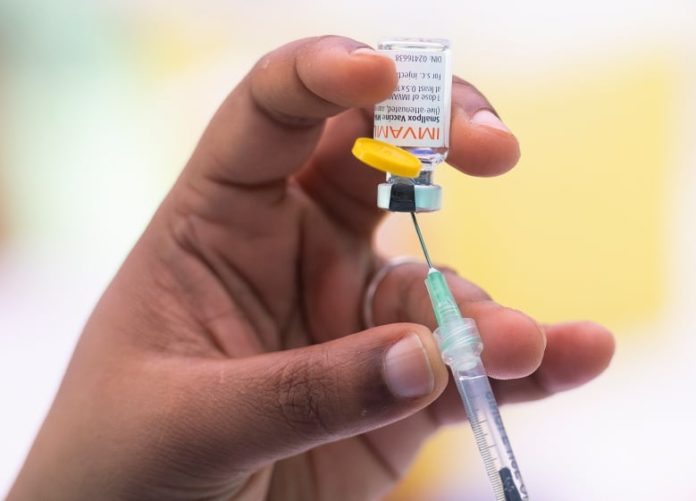The Alberta government announced on Thursday that it will begin offering the monkeypox vaccine to people who self-identify as meeting the eligibility criteria for targeted prevention prior to an exposure — bringing the province’s policy in line with British Columbia, Ontario and Quebec, where some gay and bisexual Alberta men had been travelling in order to receive shots.
Gay and bisexual men and their advocates have told CBC News that they were frustrated by having to travel to other provinces to get vaccinated against monkeypox.
While British Columbia, Ontario and Quebec have been offering preventative vaccination campaigns targeted at those considered at high risk of being exposed to the virus, until Thursday’s policy shift, Alberta was only giving the shot to people who have actually been exposed.
But as of July 29, Albertans 18 and older who self-identify as meeting the eligibility criteria for targeted prevention prior to an exposure can get the monkeypox vaccine, Alberta Health said in Thursday’s news release.
Those eligible will include:
- Transgender, cisgender or two-spirit individuals who self-identify as belonging to the gay, bisexual and other men who have sex with men (gbMSM) community and who meet at least one of the following criteria:
- Have received a recent (in the last six months) diagnosis of a sexually transmitted infection.
- Are planning to have, or in the past 90 days had, sex outside of a mutually monogamous relationship.
- Have attended venues for sexual contact within the past 90 days (e.g., bath houses, sex clubs) or may be planning to, or who work/volunteer in these settings.
- Any sexual contacts of the individuals described above.
- Staff and volunteers in a social setting or venue or event where sexual activities between men (individuals described above) may take place.
Some Albertans were seeking shots out of province
Edmonton resident Kory deGroot is planning to head to Montreal next week with his partner on holiday. While there, the two were going to try to get vaccinated because the vaccine wasn’t available to them in Alberta, despite being at higher risk of contracting the virus and fitting the vaccination criteria in other provinces.
The majority of new monkeypox cases in Canada and Europe have occurred in men who have sex with men (MSM) and deGroot, a gay man, said prior to the change that he was frustrated by what he saw as Alberta’s slow reaction to an unfolding public health emergency.
“I don’t want to get [the virus] and you know, I just want to decrease risk,” he said. “I feel like what we’ve learned through the pandemic is just, prevention is key.”
DeGroot searched Alberta Health and AHS websites for ways he might be able to get a monkeypox vaccine but couldn’t find any indication he was eligible. Then he spoke with friends and found out it was being offered in Montreal.
“So we do plan on getting it while we’re there because tourists can get the monkeypox vaccine,” he said.
Many places in Canada have already been approaching vaccination based on self-identified behaviours, vaccinating trans people, gay, bi and other groups of men who have sex with men who are having non-monogamous sex.
An Alberta Health Policy dated June 7 said the monkeypox vaccine was only available to those who have been exposed to the virus.
As of Wednesday, Alberta had given out 36 doses of Imvamune, the vaccine used to prevent and treat monkeypox and smallpox. The province currently has 1,200 doses from the federal government and is working with the feds to acquire more, according to an Alberta Health spokesperson.
As of July 26, there have been 13 confirmed case of monkeypox in Alberta.
By comparison, there have been 58 monkeypox cases in B.C., as of July 26.
Vancouver Coastal Health (VCH), the B.C. health authority stretching from Richmond to the Sunshine Coast and part of the Central Coast, started a pre-exposure vaccination campaign on July 1. It targets transgender people, gay, bisexual and other men who have sex with men who meet additional high-risk criteria and are 18 years old and over, a spokesperson said in an email.

As of July 26, VCH had vaccinated more than 6,000 people — some of whom reside outside of B.C. — at booked clinic appointments and at pop-up outreach clinics at events and businesses in Vancouver’s queer community.
“We are not actively encouraging people from outside of B.C. to seek vaccination at our clinics,” wrote VCH public affairs specialist Jeremy Deutsch, “but if they are in the VCH region and meet the eligibility criteria, they can be vaccinated.”
Deutsch added they did not know how many or what percentage of patients had come from out of province.
Many who work in gay men’s health see it only as a matter of time before case numbers start to grow in Alberta.
“Even though our case numbers are still relatively low in comparison to places like Ontario, Quebec and in British Columbia, it’s hard not to see us as behind the eight ball,” said Nolan Hill, a gay men’s heath specialist at the Centre for Sexuality in Calgary.
He said there is a lack of information from the provincial government for patients who are increasingly asking about testing and vaccinations for monkeypox when coming in for STI testing.
Instead it’s falling on the community who are often left in the dark, which he said leads to increased stigma and worries of monkeypox being seen as a gay disease.
“That lack of information just I think breeds a sense of mistrust and a sense of feeling left behind by the health system,” he said.
“We’ve seen that there is historical mistrust of the community, in our health systems, starting all the way back in with the AIDS epidemic.”
DeGroot is hopeful the lack of pre-exposure vaccination isn’t because of discrimination but still worries it could be.
“It would be interesting to see the response if it was impacting a different demographic, for sure,” he said.
DeGroot still plans to get his vaccine when he heads to Montreal next week but he worries about the equity issues for those who aren’t planning vacations or just can’t afford the plane ticket.
“If it continues to be like the only way that Albertans can get a vaccine is by travelling out of province,” he says, “that is a huge concern.”








